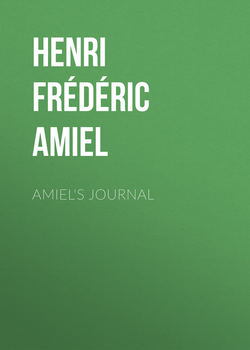Amiel's Journal

Реклама. ООО «ЛитРес», ИНН: 7719571260.
Оглавление
Henri Frédéric Amiel. Amiel's Journal
PREFACE TO THE SECOND EDITION
PREFACE
INTRODUCTION
AMIEL’S JOURNAL
Отрывок из книги
This translation of Amiel’s “Journal Intime” is primarily addressed to those whose knowledge of French, while it may be sufficient to carry them with more or less complete understanding through a novel or a newspaper, is yet not enough to allow them to understand and appreciate a book containing subtle and complicated forms of expression. I believe there are many such to be found among the reading public, and among those who would naturally take a strong interest in such a life and mind as Amiel’s, were it not for the barrier of language. It is, at any rate, in the hope that a certain number of additional readers may be thereby attracted to the “Journal Intime” that this translation of it has been undertaken.
The difficulties of the translation have been sometimes considerable, owing, first of all, to those elliptical modes of speech which a man naturally employs when he is writing for himself and not for the public, but which a translator at all events is bound in some degree to expand. Every here and there Amiel expresses himself in a kind of shorthand, perfectly intelligible to a Frenchman, but for which an English equivalent, at once terse and clear, is hard to find. Another difficulty has been his constant use of a technical philosophical language, which, according to his French critics, is not French—even philosophical French—but German. Very often it has been impossible to give any other than a literal rendering of such passages, if the thought of the original was to be preserved; but in those cases where a choice was open to me, I have preferred the more literary to the more technical expression; and I have been encouraged to do so by the fact that Amiel, when he came to prepare for publication a certain number of “Pensées,” extracted from the Journal, and printed at the end of a volume of poems published in 1853, frequently softened his phrases, so that sentences which survive in the Journal in a more technical form are to be found in a more literary form in the “Grains de Mil.”
.....
April 2, 1852.—What a lovely walk! Sky clear, sun rising, all the tints bright, all the outlines sharp, save for the soft and misty infinite of the lake. A pinch of white frost, powdered the fields, lending a metallic relief to the hedges of green box, and to the whole landscape, still without leaves, an air of health and vigor, of youth and freshness. “Bathe, O disciple, thy thirsty soul in the dew of the dawn!” says Faust, to us, and he is right. The morning air breathes a new and laughing energy into veins and marrow. If every day is a repetition of life, every dawn gives signs as it were a new contract with existence. At dawn everything is fresh, light, simple, as it is for children. At dawn spiritual truth, like the atmosphere, is more transparent, and our organs, like the young leaves, drink in the light more eagerly, breathe in more ether, and less of things earthly. If night and the starry sky speak to the meditative soul of God, of eternity and the infinite, the dawn is the time for projects, for resolutions, for the birth of action. While the silence and the “sad serenity of the azure vault,” incline the soul to self-recollection, the vigor and gayety of nature spread into the heart and make it eager for life and living. Spring is upon us. Primroses and violets have already hailed her coming. Rash blooms are showing on the peach trees; the swollen buds of the pear trees and the lilacs point to the blossoming that is to be; the honeysuckles are already green.
April 26, 1852.—This evening a feeling of emptiness took possession of me; and the solemn ideas of duty, the future, solitude, pressed themselves upon me. I gave myself to meditation, a very necessary defense against the dispersion and distraction brought about by the day’s work and its detail. Read a part of Krause’s book “Urbild der Menschheit” [Footnote: Christian Frederick Krause, died 1832, Hegel’s younger contemporary, and the author of a system which he called panentheism—Amiel alludes to it later on.] which answered marvelously to my thought and my need. This philosopher has always a beneficent effect upon me; his sweet religious serenity gains upon me and invades me. He inspires me with a sense of peace and infinity.
.....